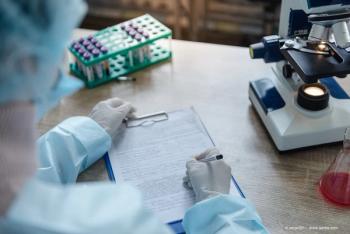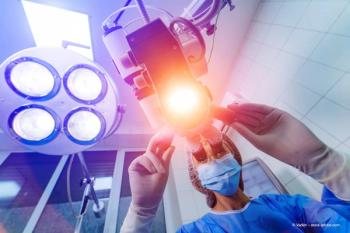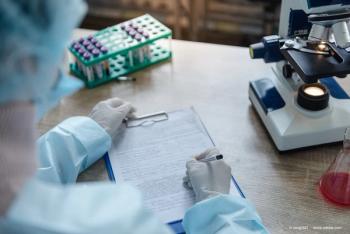
ARVO heads north to Vancouver for 2019 annual meeting
‘From the Bench to Bedside and Back’ is focal point for this year’s conference
Save the date for these future ARVO meetings
- 2020 May 3 to 7, Baltimore
- 2021 May 2 to 6, San Francisco
- 2022 May 1 to 5, Denver
- 2023 April 23 to 27, New Orleans
- 2024 May 5 to 9, Seattle
Venturing outside the United States for the first time, the Association for Research in Vision and Ophthalmology (ARVO) continues to move its annual meeting to new venues, and this year it is heading north of the border to Vancouver, British Columbia. Set for April 28 to May 2, this year’s meeting has the theme “From Bench to Bedside and Back.”
According to ARVO, an increasing amount of research conducted in labs today travels the full journey from bench to bedside. Whether researchers are studying the genetics of disease or the possibilities of a new technology to diagnose, treat or prevent an eye condition, their work often begins with a burning question that drives their work.
This leads them to answers during a journey to a patient’s bedside for a novel treatment. Sometimes, that very treatment may lead to more questions, leading researchers back to the bench. This important cycle of discovery will be at the forefront of this year’s annual meeting. Here are some of the highlights that are planned for the meeting, including keynotes and lectures:
ARVO/Alcon keynote series
The 2019 opening and closing ARVO/Alcon Keynote Lectures will give meeting attendees a chance to dig deep into elements of the meeting theme and learn how scientists are working to better understand genetics in order to address diseases that impact the eye and vision.
Sunday, 10:15 to 11:45 a.m.
“How Cells Export Proteins and RNA - Applications to the Treatment of Disease” will be the topic for Randy W. Schekman, PhD, who is a Nobel Laureate (Physiology or Medicine, 2013).
Dr. Schekman also is an investigator at Howard Hughes Medical Institute and professor of cell and developmental biology, Department of Molecular and Cell Biology, University of California at Berkeley, as well as adjunct professor of biochemistry and biophysics, University of California, San Francisco.
Dr. Schekman has studied how cells transport proteins from their site of synthesis in the endoplasmic reticulum to their various ultimate destinations inside or outside the cell, using membrane vesicles as a vehicle. His research has involved yeast as a model organism.
Dr. Schekman’s work has harnessed the power of yeast genetics to understand this fundamental biological process of intracellular vesicular trafficking.
Thursday, 4:30 to 6 p.m.
The topic of the closing keynote address will be “Models of Translational Science to Span Innovation Gaps in Academia,” given by Martin Gleave, CM, MD, FRCSC, FACS, who is director of The Vancouver Prostate Centre. He also is Liber Ero British Columbia Leadership Chair in Prostate Research and distinguished professor and vice chairman, Department of Urological Sciences, University of British Columbia, Vancouver. Dr. Gleave’s research demonstrates how science can successfully move from the lab bench to therapeutic intervention.
His studies have centered around characterizing the molecular mechanisms that mediate treatment resistance in cancer, focusing on stress-activated adaptive responses that drive acquired treatment resistance and designing rational combination co-targeting strategies to abrogate the stress response to create conditional lethality and improve cancer control. He has patented several anti-cancer drugs and, in 2001, founded OncoGenex Technologies, for which he serves as chief scientific officer.
Award Lectures
There will be several Award Lectures. These include:
The Proctor Award Lecture, Sunday, noon to 12:45 p.m.
Jerry Niederkorn, PhD, FARVO, will deliver the lecture on the topic “The Eye Sees Eye to Eye with the Immune System.”
Friedenwald Award Lecture, Monday, 3 to 3:45 p.m.
Donald Zack, MD, PhD, FARVO, will present the Friedenwald Award Lecture, speaking on the topic “From Transcription to Drug Discovery, and From Photoreceptors to RGCs, a Fun Journey.” Retinal neurodegenerative diseases, which include age-related degeneration, retinitis pigmentosa, and glaucoma, are a major cause of blindness worldwide.
Weisenfeld Award Lecture, Tuesday, 1:45 p.m. to 2:30 p.m.
Sheila West, PhD, FARVO, will present the lecture, speaking on the topic “Toward the Elimination of Disease.” Of the diseases targeted for elimination by The World Health Organization, two are leading causes of blindness worldwide. Research that identified who is at risk of the disease, created better diagnostic and program tools to guide and monitor interventions, and pushed programs to go “the last mile” to ensure elimination is the story of global partnerships. This lecture will explore the lessons learned from vision scientists who contributed to the elimination efforts.
Cogan Lecture, Wednesday, 2 p.m. to 2:45 p.m.
Przemyslaw Mike Sapieha, PhD, will speak on the topic “Communication in Retinal Vascular Disease.” Dr. Sapieha’s lab has been deciphering the contribution of neurovascular and neuroimmune cross-talk to retinal vascular diseases.
Beckman-Argyros Award Lecture, Thursday, 3:15 p.m. to 4:14 p.m.
Mark F. Bear, PhD, who is the Picower Professor of Neuroscience in The Picower Institute for Learning and Memory and the Department of Brain and Cognitive Sciences at MIT, will give the lecture. Dr. Bear’s work focuses on harnessing synaptic plasticity to promote recovery from amblyopia.
Other lectures will include: The 2019 Basic Clinical Lecture, from 8 a.m. to 10 a.m. Sunday, will have the topic “A Window on the Soul: How Systemic Disease Manifests in the Eye.”
Speakers will include Maya KoronyoHamaoui, Nicholás Cuenca, José Capo-Aponte, Yang Sun, and Colleen Cebulla. Speakers for the Champalimaud Vision Award Lecture, from 5:45 p.m. to 6:45 p.m. Tuesday, will include Jean Bennett, MD, PhD, of Scheie Eye Institute and Robin Ali, PhD, of Moorfields Eye Hospital.
The António Champalimaud Vision Award is presented to active research groups involved in basic or clinical research which has led to a major breakthrough in the understanding and/ or the preservation of vision.
This year’s awardees’ work led to the successful treatment of a genetic cause of childhood blindness, a version of Leber congenital amaurosis, and demonstrated the potential for future developments in gene therapy to cure other inherited diseases.
ARVO Symposia Sunday, 8 A.M. to 10 A.M.
“Approaches to restoring vision: Where are we now?” Sunday, 8 a.m to 10 a.m.
Restoring vision is the common aim of many researchers and has led to a variety of approaches. This symposium will bring together leading experts representing these different approaches, including retinal prostheses, gene therapy, cell replacement, and optogenetics.
“The Potential and Pitfalls of Big Data,” Sunday, 8 a.m. to 10 a.m.
The use of “Big Data” has increased in ophthalmology over the past five years, and includes mining administrative databases, using electronic medical records, and leveraging telemedicine data. This session will describe the advantages and limitations of big data and related analyses and review how big data can be integrated into ophthalmology research and clinical settings.
“The Gut-Eye Axis: Emerging Roles of the Microbiome in Ocular Immunity and Disease,” Thursday, 8 a.m. to 10 a.m.
The gut serves as host to a diverse population of microorganisms, and research linking the significance of the gut microbiome to health and disease has exploded in the past decade. The composition of the intestinal microbiota has been found to be crucial for host metabolic efficiency, regulation of the immune system, tumor growth in cancer, and neurological and developmental health.
Recent ophthalmology research has uncovered a critical role for the gut microbiome in ocular health and responses to diseases. This symposium will bring together leading scientists who will share their latest research on the impact of the gut microbiome on the nervous system, ocular immunity, and ocular diseases such as diabetic retinopathy and macular degeneration.
“The single cell revolution: Novel insights and applications for single cell RNA sequencing in eye research,” Thursday, 8 a.m. to 10 a.m.
Single-cell mRNA-sequencing (scRNA-seq) is rapidly revolutionizing biomedical research and accelerating the development of personalized medicine. This unbiased, high-throughput and high-resolution analysis of individual cell transcriptomes is revealing previously unappreciated detail about the heterogeneity of cell populations, their origins, and functions in development and disease.
This symposium will review new research approaches using scRNA-seq technologies and cutting-edge bioinformatic pipelines. Presentations will cover glial cell biology, retinal cell development and degeneration, vascular endothelial cells, and immunology.
Mini-Symposia
Sunday, 3 to 4:45 p.m., “New and Emerging Clinical Trials Endpoints” and “Emerging Gene-Driven Therapies for Anterior Segment Disease.”
Monday, 8:15 to 10:15 a.m., “Healthcare Transformation with AI: Impact in Glaucoma and Ophthalmology” and “Frontiers in Membrane Dynamics and Cellular Communication: Impact on Vision and Disease Mechanisms.”
The mini-symposia continue Monday, with “Of Mice and Men: Comparing Primate and Rodent Retina” offered from 11:15 a.m. to 1 p.m. Monday’s offerings end with “Emerging cell-based therapies to tackle retinal diseases” from 4 to 5:45 p.m. From 8:45 to 10:30 a.m.
Tuesday, offerings include “Aging with Vision Loss: Understanding the Aging Consequences of Visual Impairment” and “Clinical Outcomes and Visual Quality with Retinal Prosthetic Vision Restoration.” Tuesday’s sessions continue from 11:45 a.m. to 1:30 p.m. with three offerings. These include: “Innate Immune Memory and the Eye”; “Lacrimal Gland Biology in Homeostasis, Disease and Repair” and “Unresolved issues in Myopia.” Tuesday’s offerings conclude with “Mechanisms and Biomechanics of Traumatic Retinal Hemorrhage in Children” from 2:45 to 4:30 p.m.
The mini-symposia continues with “P2X7 receptor: One Target for inflammatory responses in different ocular diseases” and “Repurposing Drugs for the Treatment of Retinal Diseases,” both from 8:15 to 10 a.m. Wednesday.
From 10:15 a.m. to noon Wednesday, “Precision through Measurement: Biomarkers in Health and Disease” will be presented. The events conclude from 3 to 4:45 p.m. Wednesday with “Physiological Biochemistry of the Lens.”
Breakfast with an expert
Breakfast with an Expert sessions will be held from 7 a.m. to 8:30 a.m. Tuesday. Some sessions were already selling out at press time. Topics and experts include:
- “Applying to Ophthalmology Residency Programs,” Jacque L. Duncan, MD
- “Finding your niche in research,” Rajashekhar Gangaraju, PhD
- “Choosing (and securing) an Ophthalmology Fellowship,” William F. Meiler, MD
- “Maximizing Scientific Achievement,” Joyce Tombran-Tink, PhD, FARVO
- “Maximizing Scientific Achievement.” Paul S. Bernstein, MD, PhD
- “Funding Opportunities for Young Scientists (government focus), Houmam Araj, PhD
- “How to Make Yourself Visible,” Ashok Kumar, PhD
- “How to Make Yourself Visible - Learning to Self-Advocate,” Julia Busik, PhD
- “Basic Research in Ophthalmology - Why? How?” Falk Schroedl, PhD
- “Careers in Industry,” Miller J. Ogidigben, PhD, FARVO
- “Running a Successful Research Lab,” Daniel J.J. Carr, PhD
- “Interaction with non-US Pharma,” Mark Gillies, MB BS, PhD, FRANZCO
- “Work life integration,” Lisa Ostrin, OD, PhD
- “Work life integration,” Tonia S. Rex, PhD, FARVO
- “Juggling Clinical and Science in the Early Years,” Balamurali K. Ambati, MD, PhD
- “Taking Charge of Advancing Your Career,” Adrienne Graves, PhD
- “Taking Charge of Advancing Your Career,” Jia Yin, MD, PhD
- “Getting Published: Tips on Writing a Paper,” Sunil Chauhan, DVM, PhD
- “Getting Published: Tips on Writing a Paper/Effective Communication: Tips for Presenting and Publishing,” P. Michael Iuovone, PhD
- “Getting Published: Tips on Writing a Paper/Effective Communication: Tips for Presenting and Publishing,” Alon Harris, PhD
- “Combining clinical ractice, clinical research and basic science - can you do it all?” Reza Dana, MD, MSc, MPH
- “Combining Clinical Practice, Clinical Research and Basic Science - Can You do it All?” Jeffrey Goldberg, MD, PhD
- “How to Secure Charitable Funding,” Diane Bovenkamp, PhD
- “How to Secure NEI Funding,” Neeraj Agarwal, PhD, FARVO
- “How to Secure NEI Funding,” Nicholas A. Delamere, PhD
- “Practical Advice for Foreign Trained Medical Professionals” Pedram Hamrah, MD, FACS
- “Basic research in ophthalmology. Why? How?” Andrew Carkeet, PhD
- “Applying to Ophthalmology Residency Programs,” Jennifer R. Chao, MD, PhD
Special meetings
Special interest meetings also will be held during the conference. These include:
Sunday, 1 to 2:30 p.m.
- New Perspectives on Sub-RPE
- Deposit Formation: Discussing Clinical and Molecular Progress
- Protection, Correction, Regeneration: Are Combination Therapies in the Future for Inherited Retinal Degenerations?
- New Ideas about Metabolic Interactions Between Photoreceptors and Müller Cells
- Diabetic Keratopathy: An Understudied Corneal Disease
- Tear Film, Inflammation and the Nervous System - The Three Pillars of Dry Eye Disease Resulting in Symptoms of Discomfort
- Biomechanical Injury and Inflammatory Signaling in the Eye
- Findings of the International Myopia Institute White Paper Reports
Monday, 1:15 to 2:45 p.m.
- Glia in Blood-Retina Barrier Disorders
- Next Generation Sequencing for Pathogen Discovery: Ready for Prime Time?
- Cellular and Molecular Imaging of the Retina in Health and Disease
- Tear Biomarkers of Ocular Surface Diseases in the Clinic
- Managing Patients with Diabetic Macular Edema, Diabetic Retinopathy, Neovascular and Non-Neovascular AMD, and Retinal Vein Occlusion: How Do We Best Utilize the Latest Data from Clinical Trials
- Aging as a Factor in Eye Diseases
- Health Disparities, Social Justice and Vision Research
- Lipids in Diverse Functions and Pathologies of the Eye Tuesday, 7 to 8:30 a.m.
- Diabetes and its Ocular Complications
- Cutting Funding Requirements of Third World Researchers by 3D-Printers, Drone Slitlamps and AIRBNB-Style Equipment Sharing
- OCT Guided and Robotically Enabled Ophthalmic Surgery
- The New face of (presumed) Intraocular Tuberculosis
- Selective autophagy: A New Therapeutic Target for Retinal Diseases
- Patient Engagement in Ophthalmology Research
- Metamorphopsia – An Update on Diagnostic Methods, Treatment, and Evaluation of Novel Instruments and Questionnaires
- Hyperreflective Intraretinal Spots (foci) in Ocular Diseases: From Bench to Bedside
Wednesday, 12:15 -1:45 p.m.
- Eye and Brain - The Interrelationship and Pathology (Second Edition)
- Excellence in Sight: Enhancing the Methodological Rigor of Clinical Research to Inform Eye Care Practice and Future
- Integrating Robotics into Ophthalmic Surgery
- Retinal Ganglion Cell Differentiation from Pluripotent Stem Cells: Applications for Studying Development, Modeling Retinal Degeneration, and as a Vehicle for Cellular Replacement > Choriocapillaris Imaging with OCT Angiography
- Developing Eye Drops in Ophthalmology: Practical Considerations for Smooth Translation to the Clinic
- The Role of the Human Microbiome in Ocular Disease
- Advances and Challenges in Utilization of Artificial intelligence in Ophthalmology
Wednesday, 6:15 to 7:45 p.m.
- Focal vs Global: Is Keratoconus Pathology Driven by Focal Corneal Tissue Changes or is it a Global Corneal Defect Influenced by Systemic Factors?
- Fluorescence Lifetime Imaging Ophthalmoscopy from Bench to Bedside
- New Perspectives on MIGS
- Using Fluid Biopsies for Decision-making in Personalized Medicine in Ophthalmology
- Pathogenesis of TB-associated Uveitis: Current Status and Future
- Wnt Signaling and Regenerative Medicine for Retinal Vascular Disease
Thursday, 12:15 to 1:45 p.m.
- The Implications of Immune Response in Ocular Gene Therapy
- Re-Engineering Clinical Perimetry
- Exploring Controversial Issues in BEST1- related Retinal Disease
- Optical Coherence Tomographic Angiography of the Eye
- Lipids and Eye Diseases- Where Should We Focus?
- Emerging Biological Functions of Non-Canonical Photodetection
- Are there Alternatives to In Vivo Models in Eye Research?
Cross-sectional group sessions
These group sessions will be held on Sunday through Wednesday during the conference. The schedule includes:
Sunday, 1 to 2:30 p.m. Low Vision Group - The Effects of Mesopic Light Levels on vision and functional activities
Monday, 1:15 to 2:45 p.m. Multidisciplinary Ophthalmic Imaging Group - OCT advances in Vascular and Functional Imaging
Wednesday, 12:15 to 1:45 p.m. Genetics Group - Spotlight on Retinal Ciliopathy from Genetics to Mechanism
Additional workshops
Scheduled workshops include:
Sunday, 1 to 2:30 p.m.
- Functional Imaging Technologies for Regenerative Medicine
- Grant writing: Early Career Funding Opportunities
- Win-win Collaborations Between Academia and Industry
- The Importance of Animal Research in the Bench to Bedside Pipeline
- China-ARVO Networking Forum
Monday, 1:15 to 2:45 p.m.
- Members-in-Training career forum: Preparing for Your Future Career NOW!
- Getting Published: The Light and Dark Sides
- NIH-CSR Peer Review Workshop
- VSS at ARVO - Vision after Sight Restoration
Wednesday, 12:15 to 1:45 p.m.
- Scientists as Entrepreneurs (or How to Apply Your Science to Business)
- How do I Tell m(e)y(e) Story? -Why Effective Communication is Needed Now More than Ever to Increase Research Funding
- Clinician-Scientist Forum: How to Become a Successful Clinician-Scientist
- Overcoming the Challenges of International Collaboration in Ocular Research
- Ethical Challenges and Solutions for CRISPR Treatment in Human Eye Disorders
Thursday, 12:15 to 1:45 p.m.
- EVER/ARVO Workshop: The Breadcrumb Trail in Glaucoma: From Biology to the Patient
- Addressing Global Blindness Through International Research Collaborations-Next Frontier for 2020
- Chinese Ophthalmology Society (COS) Workshop: Cell Biology and Stem Cells
- NEI grants Workshop: New NIH Regulations Concerning Human Subject and Animal Research
Pre-meeting educational courses
Several courses will be held on Saturday before ARVO officially kicks off. There are full-day and half-day offerings. Separate registration is required.
Full-day courses will be held from 8 a.m. to 4:30 p.m. Here is the lineup:
Artificial Intelligence-From Benchtop to Bedside
Artificial Intelligence (AI), including machine-learning, is the latest innovation in information technology. The use of AI for improving healthcare outcomes already shows promise. This course will help participants define what AI is, describe applications of AI in research/ development, explain the tools behind AI, and explore the future of AI. This activity’s overall purpose is to ensure change in learner competence by providing an overview, explaining the principles of use, demonstrating examples of applications, exploring future directions, and considering ethical principles.
Diabetic Retinopathy: What’s New
The global prevalence of diabetes mellitus is predicted to increase dramatically in the coming decades, from an estimated 382 million in 2013 to 592 million by 2035. Type 2 diabetes (T2D) has already attained epidemic levels with type 1 (T1D) increasing. As a result, diabetic retinopathy (DR) is the most common microvascular complication of diabetes. As such, DR-related visual impairment and blindness has significantly increased.
Applying Electrophysiological Techniques to Translational Vision Research
With the advent of new therapies for blinding diseases involving the retina and optic nerve, there is an increasing need for functional outcome measurements that can be made in animal models and human clinical trials. The electroretinogram and visual evoked potential are translatable techniques that fit this purpose. This course will discuss the use of the electrophysiologic techniques in the understanding of retinal dystrophies, acquired retinal diseases, glaucoma and optic nerve diseases.
There also will be several half-day courses, offered from 8 a.m. to noon each day. These include:
Ocular Immunology: Fundamentals, Disease Entities and Future Therapeutic Opportunities
This course will introduce the principles of immunology and immunological privilege as it pertains to eye physiology and disease. Key aspects covered in this course include cellular and molecular factors that maintain immune homeostasis in different ocular compartments, and how breakdown of these pathways gives rise to disease etiologies, such as infection, allergy, alloimmunity, autoimmunity, and aging.
Basics of immune modulation and immune-based targeted therapies
This course will give an update on current areas of research and future opportunities for targeted immune-based therapies to increase the clinical knowledge, competence, and performance of learners. The content of this course is suitable for basic and clinician scientists new to the study of ocular immunology.
Statistical Methods for Correlated Eye Data Diverse
Sets of statistical methods for correlated eye data will be presented and explored. Selected research study designs that require the use of these statistical methods will be reviewed to evaluate the underlying models and accompanying assumptions and contrast the implications of having the two eyes in different comparison groups versus having both eyes in the same group.
Methods for continuous and binary data, with and without covariates, and for cross-sectional and longitudinal study designs will be applied to different datasets and the interpretation of results discussed. Code to implement each example in SAS, Stata, and R statistical software will be provided in course handouts. Clinical and basic researchers who need to analyze data from both eyes of study subjects or animals will benefit from this advanced level course.
*Prerequisite: Attendees should be familiar with basic statistical analysis techniques, including linear and logistic regression analysis.
Social events
A conference would not be complete without social events, and ARVO has several planned throughout the week, offering attendees opportunities for networking and just relaxing with colleagues.
Saturday, 6:30 p.m. ARVO Foundation and Dowling Society Gala, at the Vancouver Convention Centre Join the ARVO Foundation for a dinner with more than 400 members and friends to honor individuals and organizations who have shown dedication to the ARVO Foundation and its mission, while also helping support the next generation of vision scientists. This event sells out each year so do not wait to secure tickets ($345 per person).
Sunday, 7 to 10 p.m. Sunday Social: An evening at the Vancouver Aquarium (845 Avison Way, Vancouver) Enjoy animals, a dolphin-and-sea-lion show, and a 4-D movie experience. Tickets are $30 (includes admission and two drinks), with a discounted rate of $20 for children 18 and under. Registration is required; tickets can be purchased online or onsite Saturday and Sunday (depending upon availability).
Monday, 1:15 to 2:45 p.m. The Annual Women in Eye and Vision Research (WEAVR) Luncheon, at the Vancouver Convention Centre This fundraising event for the ARVO Foundation will let more than 300 attendees network over lunch. Prominent scientists from around the world will be guest speakers. While the luncheon program is designed to support women in eye and vision research, attendees of all genders are welcome to attend.
Visit https://www.arvo.org/arvo-foundation/events/women-in-eye-and-vision-research-luncheon/women-in-eye-and-vision-research-luncheon/ to learn more.
Monday, 7:30 to 9 p.m. Student/Trainee Social, at the Vancouver Convention Centre Members-in-Training are invited to join ARVO in honoring 2019 travel and research grant recipients. Mingle with your colleagues and meet members of the ARVO Board of Trustees.
Wednesday, 8 to 10 p.m. ARVO Classical Concert, at the Vancouver Convention Centre This is a longtime popular ARVO event, at which members perform well-known classical selections. Sit back, relax, and enjoy this free event.
Wednesday, 9 p.m. to midnight. ARVO Karaoke Night at The Blackbird Public House (905 Dunsumir St., Vancouver) Show your vocal talents or cheer on your favorite performer at this annual Karaoke Night! Cost is $10, which includes admission and one drink. Light snacks provided. You must be 21 years or older to attend.
Tickets can be purchased online or onsite Saturday through Wednesday (depending upon availability).
Thursday, 2 to 3 p.m. Visit Baltimore Welcomes ARVO 2020 Kick-Off Reception, at the Vancouver Convention Centre Join ARVO and Visit Baltimore as they look forward to the ARVO 2020 annual meeting, May 3 to 7.
Newsletter
Keep your retina practice on the forefront—subscribe for expert analysis and emerging trends in retinal disease management.











































